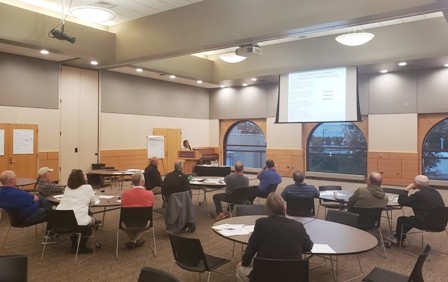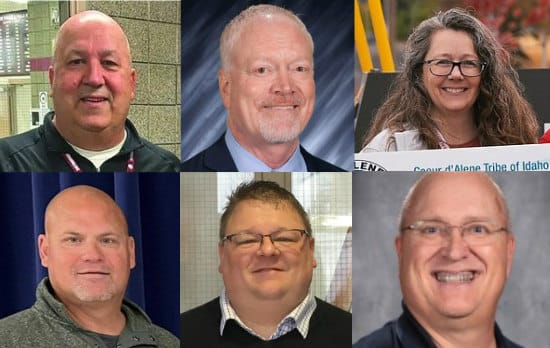On Wednesday evening Pam Whitmore, Collaboration and Mediation Manager for the League of Minnesota Cities, conducted training with about 15 members of the City of Crookston staff, council, and commissions including Mayor Guy Martin. Whitmore began the meeting talking about the difference in roles between the City Council and the city staff, which are primarily that councils are policymakers and staff handle day-to-day.
One area a council will often run into trouble is with attempting to micromanage staff according to Whitmore. One way that can happen is when councilmembers question staff during meetings on items they haven’t prepared for creating distrust. A reasonably frequent occurrence at City Council meetings often directed at Public Works Director Pat Kelly or Crookston Housing and Economic Development Authority (CHEDA) Executive Director Craig Hoiseth, as happened August 27 when Councilman Clayton Briggs questioned why the City of Crookston was transferring funds they’d recommended at a Ways & Means Committee meeting for Epitome Energy, LLC to CHEDA instead of directly to the business. It’s also commonplace for Public Works Director Pat Kelly to be questioned by the council and respond that he’ll need to look into their question because it’s the first he has heard of it.
Whitmore said doing so creates a better atmosphere and also leads to better, more informed discussions. “It’s a good best practice that I’ve seen across the state,” said Whitmore. “Where councils and staffs work more efficiently together is if there is the common practice of after packets go out. Then the elected officials have the opportunity to know if they are going to have questions and flag those question ahead of time. Then be in touch with the main staff person and say – I’m going to have questions on the chemicals in the mosquito spraying – for example. That gives the staff the opportunity to let other elected officials know that’s going to be a question that comes up. It also allows them to get the information to the elected officials by the time of the meeting so the public can hear a good discussion about that. Or get the people who need to be in the room to answer the questions to be there, so the public is well informed entering those discussions. Some elected officials want to ask those questions in the meetings, but again to be able to facilitate the best discussion and have as much information as possible makes things run a lot more efficiently with better information and better discussion. It also makes the staff feel as though they are working as a team, that [council] is not just holding onto something and calling them out in front of other people or the media, so they are better prepared.”
Independence of the boards and commissions in the code was also discussed which state “members of Council shall refrain from using their position to unduly influence the deliberations or outcomes of the board and commission proceedings. City Administrator Shannon Stassen asked about council members weighing in with their feelings during board and commission meetings, which Whitmore directed to City Attorney Corky Reynolds. Reynolds said that his feeling was a council member attending those meetings should be there to listen and learn, not to weigh in and influence. Councilman Tom Vedbraaten noted that council members who attend meetings are often asked their opinion and asked if Reynolds was saying he shouldn’t respond. Reynolds stated that in his opinion, council members are at those meetings to listen, understand, and bring information back to council meetings, not to interject.
Councilman Dale Stainbrook asked how it worked if a council member was a liaison to that board or commission. Whitmore said that best practice uses the liaison as the go-between for information between the council and commission. Planning and Zoning Commission member Bryan Schipper mentioned that sometimes it’s hard to understand why the commission is there or what their role is when council members are debating in commission meetings. Stassen also said he had seen several instances where council members are very passionate about their feelings in a commission meeting and those board members may feel swayed one way but that because other council members who don’t think that way aren’t in the meeting, it can create imbalanced representation. Whitmore said she thought the discussion on the council’s role with boards and commissions was productive. “The code of conduct has some language about council members interacting with board and commission members,” said Whitmore. “There was some good discussion about best practices for council members in attendance at commission meetings to be able to gather information and have that for use in their debate. I think it was a productive conversation about that.”
Discussing conflict of interest, Stassen asked whether if a council member declares a possible conflict of interest because of potential personal benefits would they still be able to vote. Whitmore said that it is best to refer to the City Charter or contact the city attorney if a council member isn’t sure. Councilman Steve Erickson asked that as a business owner, does he need to abstain from voting on the consent agenda if there were a payment to his business in the bills and disbursements even though it might also contain payments to his competitors. Whitmore said that one of those discussions about whether it was ethical, stating what might be ethical to some might not seem so to others. She said she wouldn’t vote on that as it since a yes vote authorizes a payment creating direct financial benefit but that if there is a question, it is best to contact the City Attorney. “There are lots of parts to it,” said Whitmore. “There is a state law part that is very clear as to what a conflict is and isn’t. One of those is incompatible offices. For example, you can’t be a city council member and fulltime employee or a city council member and a county commissioner. That is very clearly laid out. The other thing about conflict of interest in state law that is clear is you can’t directly contract with a council member, but there are certain exceptions to that in the statute like emergencies. Then cities can legislate through charter, ordinances, code of conduct additional restrictions. In the code of conduct, there is a conflict of interest for a direct financial benefit which is the same as under state law. But the code of conduct also includes language about indirect personal benefit. We had a really good discussion about what that meant, and I think the consensus was if you have a question about that to reach out to the city attorney to help make that determination, whether there is the type of benefit that would be considered not proper under the code of conduct.”
Discussing sanctions for breaking the code of ethics and conduct Vedbraaten asked how a complainant would know if anything was done after a complaint. Reynolds stated it depended on the nature and subject of a complaint which could range from a discussion which can be held privately to public censorship, such as removing a council member from serving as liaison to boards and commissions. Stassen stated he anticipated that meant in most cases for a complaint he received; he would discuss the issue with whoever the complaint was about. The consensus seemed that the complainant would like to be updated in some manner about what took place. Whitmore said she thought it came out in the discussion that the process for handling a complaint would need to be clarified more as the city moves forward. “That’s a discussion that we started to have tonight,” said Whitmore. “There is nothing in state law or anything that requires that to be laid out but I think that the elected officials and staff in the room were able to make it clear to each other that having a common practice in place would be useful for them to know how that complaint process happens. I think that is a process that came out in the discussion tonight for them to clarify a little bit more as they move forward.”
Tags:



